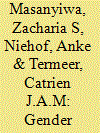|
|
|
Sort Order |
|
|
|
Items / Page
|
|
|
|
|
|
|
| Srl | Item |
| 1 |
ID:
105859


|
|
|
|
|
| Publication |
2011.
|
| Summary/Abstract |
This article describes agricultural technology extension, access to channels of information and adoption of agricultural technology in rural Guizhou, China. It addresses the questions of whether the agricultural technology extension process matches the needs of the villagers and whether in using extension services and adopting technologies there are differences between older and younger cohorts of farming households. Few farming households can get formal extension services and their main channels of information are neighbours, relatives and friends. Older cohort households like to learn by experience, while younger ones like to use written materials. There also appear to be differences in the ways women and men adopt technologies. Technology delivery and farming households' needs are not well matched. Finally, the migration context has an influence on the suitability of technologies and the feasibility of applying them.
|
|
|
|
|
|
|
|
|
|
|
|
|
|
|
|
| 2 |
ID:
131795


|
|
|
|
|
| Publication |
2014.
|
| Summary/Abstract |
Increasing participation in decision-making processes by service users is one of the objectives of decentralisation reforms in Tanzania. The argument is that decentralisation enhances participation by all sections of the community, and by women in particular, and results in decisions that better reflect local needs. This paper examines the impact of decentralisation reforms on service users' participation for delivery of water and health services in rural Tanzania, using a gender perspective and principal-agent theory. The paper investigates how decentralisation has fostered spaces for participation and how men and women use these spaces, and identifies factors that constrain or encourage women's participation. It shows that decentralisation reforms have created spaces for service users' participation at the local level. Participation in these spaces, however, differs between men and women, and is influenced by the socio-cultural norms within the household and community. Men have gained more leverage than women to exercise their agency as principals. Women's participation is contributing to addressing practical gender needs, but strategic gender needs have been less adequately addressed because gendered power relations have been largely untouched by the reforms.
|
|
|
|
|
|
|
|
|
|
|
|
|
|
|
|
| 3 |
ID:
135110


|
|
|
|
|
| Summary/Abstract |
Since the 1980s, maternal mortality in Indonesia has declined. However, it has always been high by regional standards, and its decline is now stalling. This makes it unlikely that by 2015 Indonesia will have reduced maternal mortality to the level set by the fifth United Nations Millennium Development Goal.
In Indonesia, the role of the traditional birth attendant (TBA) in childbirth has been the subject of debate and controversy since colonial times. In efforts to reduce maternal mortality, subsequent health administrations have tried to replace TBAs with modern-trained midwives. Contrary to expectations, however, even in the present era certified midwives have not fully replaced TBAs. Particularly in rural areas, the TBA remains a key actor in birthing care, although now more often in collaboration with the modern midwife.
Taking an anthropological and a historical perspective, the involvement of the TBA in birthing and maternal care, at different times and in different areas of Indonesia, is investigated and, where relevant, compared to that of TBAs in other parts of Southeast Asia. The emergent picture does not support the opinion that the TBA is to blame for high maternal mortality. Poor referral facilities, bad infrastructure and insufficient means are the more likely causes. To resolve the maternal mortality problem, governmental health policies should treat the TBA as an ally. However, such policies, and promising approaches such as partnerships and village maternity houses, can only be effective when their implementation is adequately backed up by resources.
|
|
|
|
|
|
|
|
|
|
|
|
|
|
|
|
|
|
|
|
|